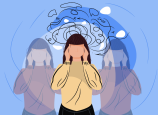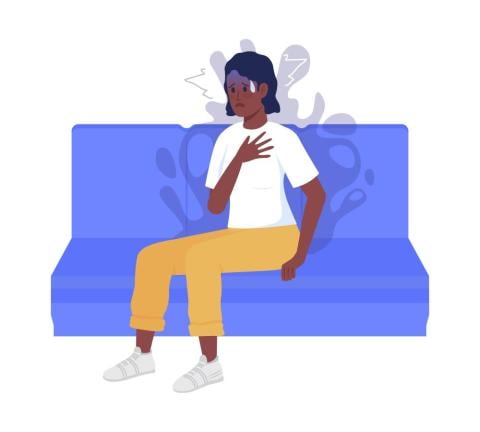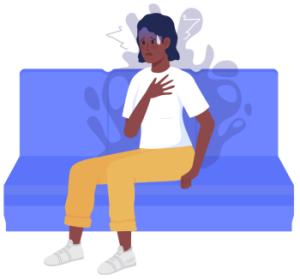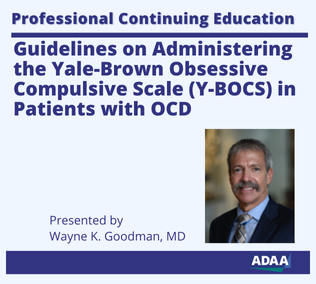Thriving in Friendships When You Have OCD
Thriving in Friendships When You Have OCD

Friends are the people we keep in our lives by choice and not because of familial bonds, work contracts, or other circumstances. They truly are the family we choose. While much has been written about the impact of OCD on romantic relationships, its effects on friendships are less widely discussed. However, for those with the disorder, finding and nurturing friendships while in the thick of symptoms can be just as difficult.
And it’s no wonder; OCD has a way of infiltrating anything that’s important, including our relationships. If you have OCD, you may:
- Have concerns about getting close to others who might judge or misunderstand your symptoms
- Worry that friends may trigger unwanted thoughts
- Find that friends become embroiled in your rituals
- Feel unworthy of being a friend due to difficulty keeping commitments or doing certain activities
Whatever gets in the way, you’re not alone in this struggle. And you can apply tools, skills, and strategies to help move you toward fulfilling connections with friends.
Clarifying Friendship Values
I encourage my clients to start by distinguishing between what the OCD demands of them and what they truly want. To this end, it’s helpful to think about what you really desire in a friendship, knowing that there’s no singular template that will work for everyone. Perhaps you want someone who will provide emotional support and long philosophical conversations. Or someone who shares your cultural background or faith. Maybe you’re just looking for a reliable running buddy. Think about how this person would fit into the mosaic of your life. Once you have a sense of that, you can begin to identify your personalized values about friendship. These might be things like fun, humor, service, or connectedness. You can write your values down and use them as a touchstone when OCD steers you in the direction of avoidance.
Changing Your Behavior
Now you can begin to examine how your behavior aligns with those values. That is, do you want to join a hockey team with your friends but worry about harming someone with your skate blade? Do you crave a buddy for game nights but hesitate to have new people in your home because of contamination fears? Do you avoid spending time with a friend because your OCD tells you that they might think you’re flirting inappropriately? These are just a few common examples of how OCD can derail your behavior, but they’re certainly not the only ones. In fact, OCD is endlessly creative; for every kind of symptom, there’s a way that it can affect friendships. Take stock of how your behavior is influenced by OCD and how it limits the way you live by your values.
Realigning your behavior with your friendship values takes bravery! It means stepping out of your comfort zone in the service of developing relationships. OCD often says that if we want to make changes, we must do so wholeheartedly, perfectly, and completely. That is, if your symptoms are preventing you from playing hockey, you should suck it up, put on your sharpest skates, and join the team. But this is just another barrier that OCD puts up to making changes – it demands that there’s only one way to do it – and that if you don’t, you’ve failed! Realistically, there are many steps that you can take toward making friends or improving the friendships you have. These may start out small, like practicing some basic puck-handling drills with a friend, and may increase over time to playing with a full team. You can still nurture these connections without letting OCD completely call the shots.
Challenging Your Beliefs
It’s also important to remember that OCD often limits your behavior not because of an imminent risk but because of an inflated “what-if.” OCD takes a maybe (and often a very improbable one at that) and portrays it as a terrible inevitability. Remind yourself that fostering connections you crave with others is worth the small risk it poses. This can help you select behaviors that prioritize your social needs. See if your OCD is trying to convince you that:
- You must be cautious to avoid catastrophes.
- You must act perfectly as a friend.
- Feeling scared means that there is danger.
- Not being 100% sure about an outcome means that it’s not worth the risk.
- Having a scary thought means that you’re immoral/dangerous/disgusting.
These are some common beliefs that people with OCD often struggle with, but there may be others that come up for you. Identifying these thoughts as OCD’s mental accomplices and acting in defiance of them can help you move toward the relationships you want.
Disclosing Your OCD to Friends
Finally, people are often concerned about when or how to disclose their OCD to friends. Understandably, they worry this will lead to criticism or confusion. Limited knowledge of OCD by the public may lead to uncomfortable conversations about what OCD truly is or why you can’t just snap out of symptoms. The choice to disclose comes down to examining the pros and cons of doing so – for example, what might you gain by friends’ understanding that your lateness is not lack of care or that your distraction is not lack of interest. And considering how can those friends then join your team to help put you back in the driver’s seat of your life. Ultimately, the choice is yours and may be tied back to your values for each friendship. That is, if it’s important to be authentic, for example, you might be more inclined to share. If your friendship is based on a shared interest, you may feel that it’s less important.
If you’re someone with OCD, you deserve to have warm, rewarding friendships. Even though this can be difficult, it’s worth the work to find and nurture these connections.
- My book: Thriving in Relationships When You Have OCD: How to Keep Obsessions and Compulsions from Sabotaging Love, Friendship, and Family Connections
- My clinic’s website: ocdnashville.com
- Clinic Instagram: @NOATC
This post is presented in collaboration with ADAA's OCD and Related Disorders SIG. Learn more about the SIG.





















